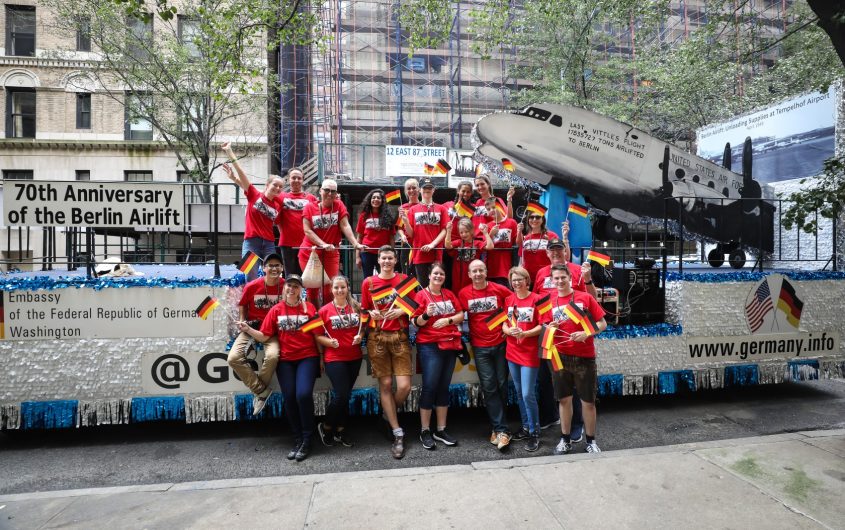
Getting Over the Cold War. Why German-American Relations Need a New Narrative

Jacob Eder
Friedrich-Schiller-University Jena
Dr. Jacob Eder teaches contemporary history at the Friedrich-Schiller-University Jena. He is currently a Feodor Lynen-Fellow of the Alexander von Humboldt Foundation at the History Department of New York University and a Visiting Fellow at NYU’s Remarque Institute. Jacob studied Modern History and American Studies at the Ludwig-Maximilians-University Munich, spent a year on a Fulbright Scholarship at the University of Nebraska-Lincoln, and holds a PhD in History from the University of Pennsylvania. He is the recipient of numerous research grants and fellowships, including a Charles H. Revson Foundation Fellowship from the United States Holocaust Memorial Museum, fellowships from the Gerda Henkel Foundation and the German Historical Institute, and a Mellon Foundation Fellowship in Cold War/Post1945 International History from the George Washington University. He was also a visiting lecturer and a visiting scholar at the Hebrew University of Jerusalem. For his dissertation, Jacob received the Fraenkel Prize in Contemporary History of the Wiener Library, the Marko Feingold Dissertation Prize in Jewish Studies of the University of Salzburg, and the Betty M. Unterberger Dissertation Prize of the Society for Historians of American Foreign Relations. He recently received Jena University’s teaching award for a seminar on memory in Germany and Israel, which brought together students from Jena and Jerusalem.
Dr. Eder is the author of Holocaust Angst: The Federal Republic of Germany and American Holocaust Memory since the 1970s (Oxford University Press, 2016) and the co-editor of Holocaust Memory in a Globalizing World (Wallstein, 2017). He is currently working on a book about the history of American Jewish relief organizations in the twentieth century.
He is a 2018-2019 participant in AICGS’ project “A German-American Dialogue of the Next Generation: Global Responsibility, Joint Engagement,” sponsored by the Transatlantik-Programm der Bundesrepublik Deutschland aus Mitteln des European Recovery Program (ERP) des Bundesministeriums für Wirtschaft und Energie (BMWi).
According to the planners of Germany’s current year-long public diplomacy campaign, Deutschlandjahr USA, Germany and the United States are “Wunderbar Together.” Under this—some would say catchy, some would say naïve—slogan, the campaign hosted by the German foreign ministry, the Goethe-Institute, and the Federation of German Industries offers a wide display of examples for German-American friendship and partnership. For instance, the program highlights the current economic cooperation between both countries and the impressive number of jobs created by German companies in the United States. With regard to the long-term foundations of the relationship, “Wunderbar Together” points to the countries’ shared history, particularly the 70th anniversary of the Berlin Airlift. The German embassy chose the same topic for its float in this year’s Steuben Parade, arguing that “the Airlift is considered a turning point after the Second World War for the German-American friendship.”
Such references to the Berlin Airlift offer an opportunity to ponder the relevance of the Cold War years to the current relationship, which are often idealized as the “good old days” of the German-American friendship. Of course, the years between the end of World War II and the collapse of the Soviet Union form an important cornerstone for German-American relations. The Cold War saw the establishment of an alliance between the two former enemy nations, along with the creation of institutions and channels of communication that still shape the transatlantic relationship today: NATO, the Fulbright Program, America Houses, the Congress-Bundestag Youth Exchange Program, and so on. Given the current tensions and conflicts between Berlin and Washington, however, it is time to find new narratives for the transatlantic partnership and overcome Cold War nostalgia, which no longer provides a convincing argument in favor of this relationship.
Cold War nostalgia only works if one applies a highly selective approach toward history.
In fact, Cold War nostalgia only works if one applies a highly selective approach toward history. To long for the “good old days” of German-American friendship during the Cold War means to forget the suffering of millions who paid the price for a pacified European continent after 1945. Celebrating events like the Berlin Airlift as a turning point for German-American friendship is also shortsighted in another way: it puts too much emphasis on this friendship as a West German-American affair. This narrative not only assigns East Germany the status of a mere footnote in the success story of postwar Germany’s long road to the West, it also fails to take the millions of “new” Germans—from the so-called guest workers and their descendants to the most recent immigrants—into consideration. For them, the Cold War does not necessarily resonate as a positive memory.
Glorifying U.S. help for postwar West Germany also sends the wrong message to audiences in the United States. The display of gratitude for the—admittedly remarkable—achievement of the Airlift is a not so subtle reminder of the times when Germany was still a priority for United States foreign policy. Herein lies the most significant problem of German Cold War nostalgia: it indicates a failure to acknowledge that not only U.S. political priorities, but also U.S. society as a whole have changed dramatically over the past decades. Politically, the United States pays less and less attention to Europe, looking now toward China, the Pacific region, and Latin America. Also demographically, the country is becoming less and less “European” with massively increasing numbers of foreign-born citizens from Asia, Latin America, and the Caribbean.
Instead of nostalgic introspection, a celebration of past achievements, or the hackneyed talk of “shared values,” German public diplomacy should conceive of a new, relevant, and plausible narrative for this partnership.
Instead of nostalgic introspection, a celebration of past achievements, or the hackneyed talk of “shared values,” German public diplomacy should therefore conceive of a new, relevant, and plausible narrative for this partnership. And indeed, the numerous events and programs sponsored by “Wunderbar Together” are cause for optimism in this regard. Even though the overall justification for the Deutschlandjahr points, among others, to the 70th anniversary of the Berlin Airlift, the vast majority of projects and events do not focus on Cold War era events and sentiments. They offer a multifaceted image of Germany in the present. “Wunderbar Together” is also a welcome departure from earlier public diplomacy campaigns as it does not limit itself to the metropolitan areas on the coasts, but engages diverse audiences all over the United States.
Nevertheless, public diplomacy is not only about events and audiences abroad, it also reflects how its planners see and understand their own country. And here, the blind spots of the campaign become apparent. One area that “Wunderbar Together” particularly neglects is the transformation German society has experienced through migration—an issue whose relevance for political, social, economic, and cultural realties on both sides of the Atlantic is hard to underestimate. Migration, not economic cooperation or Cold War nostalgia, would be a highly topical conversation starter with audiences in the United States: What does migration mean in terms of transnational entanglements with other countries, cultures, and societies? How does one take advantage of domestic opportunities and work toward solving problems related to migration? And what do the millions of “new” Americans and Germans have to say about the transatlantic partnership? There is hardly a more important and pressing area to bring both societies into a conversation with each other.
True, it is also a divisive topic, and it may not come as a surprise that public diplomacy prefers to talk about less controversial issues. Yet in times like these, when even the U.S. president questions the foundations of the transatlantic partnership, German public diplomacy should be more than mere “advertising” or a celebration of past achievements. A bold, future-oriented public diplomacy would therefore certainly not ignore the countries’ shared history. More than that, however, it would emphasize capabilities to solve concrete problems and point to issues of shared concern. It would respond to a vastly changed geopolitical environment. It would not merely acknowledge demographic transformations, but also include new actors in the conversation and, in doing so, contribute to building a new and sustainable structure for the transatlantic partnership.








